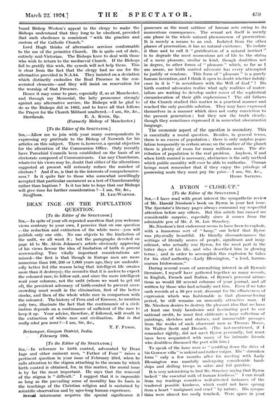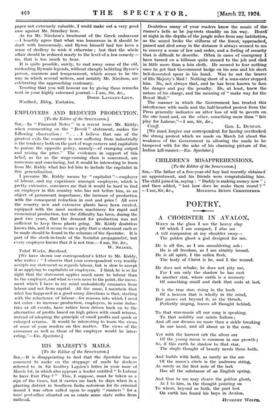A BYRON " CLOSE-UP."
[To the Editor of the SPECTATOR.] SIR,—I have read with great interest the sympathetic review of Mr. Harold Nicolson's book on Byron in your last issue. The Spectator's literary pages always command my respectful attention before any others. But this article has caused me considerable surprise, especially since it conies from the admirable pen of Mr. J. St. Loe Strachey.
Mr. Nicolson's first endeavour seems to have been to explode, with a humorous sort of " bang," our belief that Byron was physically beautiful. He blandly discountenances the writings of literally scores of people, significant and insig- nificant, who actually saw Byron, for the most part in the latter days of his life, and who described him in glowing terms ; and in order to accomplish this explosion he takes for his chief authority—Lady Blessington, " a loud, harum- scarum Irishwoman."
During several years of unremitting interest in all Byronic literature, I myself have gathered together as many records, in English, French and Italian, of Byron's personal attrac- tions as would fill several columns of your journal, and all written by those who had actually met him. Even if we take such records at a 50 per cent. discount for the effusiveness of expression which was fashionable in that glamour-loving period, he still remains an unusually attractive man.- If Mr. Nicolson desires to destroy the pleasant idea that we have at least one truly handsome and fascinating poet to our national credit, he mast first obliterate a large collection of paintings, sketches and statues, and innumerable passages from the works of such observant men as Thomas Moore, Sir Walter Scott and Disraeli. (The last-mentioned, if I remember rightly, did not meet Byron personally, but must- have been acquainted with many of his intimate friends who doubtless discussed the poet with him.)
To speak of the lame man as " waddling down the drive of his Genoese villa" is unkind and rather vulgar. His " shrunken form " only a few months after his meeting with Lady Blessington was manfully undergoing considerable hard- ships and drilling troops in sabre and foil practice.
It is very astonishing to find Mr. Strachey saying that Byron lacked " the essential milk of human kindness." I can recall from my readings countless well-attested instances of the tenderest possible kindness, which could not have sprung from a heart " malignant and cruel " by nature. His sympa- thies were almost too easily touched. Were space in your paper not extremely valuable, I could make out a very good case against Mr. Strachey here.
As for Mr. Nicolson's treatment of the Greek endeavour —I heartily agree that what was humorous in it should be dealt with humorously, and Byron himself had too keen a sense of drollery to wish it otherwise ; but that the whole affair should be reduced nearly to the level of a low comedy— no, that is too much to bear.
It is quite possible, surely, to cast away some of the old, misleading Byronic legends, without cheaply belittling Byron's person, manners and temperament, which seems to be the way in which several writers, and notably Mr. Nicolson, are celebrating the approaching centenary.
Trusting that you will honour me by giving these remarks vent in your highly esteemed journal.—I am, Sir, &c.,















































 Previous page
Previous page